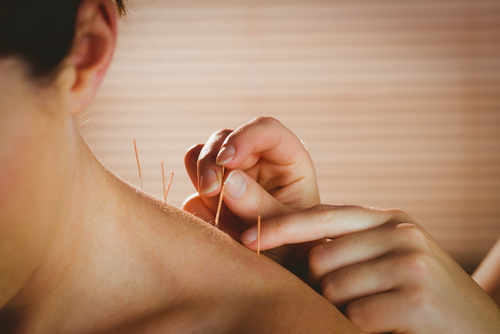Acupuncture May Help Alleviate Parkinson’s Motor Symptoms, Preclinical Data Suggest

Acupuncture may be beneficial to alleviate motor symptoms associated with Parkinson’s disease, according to data collected from mouse studies.
The findings were published in the study, “Does Acupuncture Protect Dopamine Neurons in Parkinson’s Disease Rodent Model?: A Systematic Review and Meta-Analysis,” in the journal Frontiers in Aging Neuroscience.
Acupuncture has long been used in East Asian countries to treat motor dysfunctions and neurological disorders such as Parkinson’s.
Evidence suggests that acupuncture may enhance motor function-associated neural responses in patients with Parkinson’s, and its effect has been shown in clinical studies: Parkinson’s patients who underwent bee venom acupuncture treatment saw their motor function improved; and “motor function-associated neural responses” with acupuncture have been shown in Parkinson’s patients using magnetic resonance imaging.
To understand the extent to which acupuncture affects the recovery of dopaminergic neurons — those affected in Parkinson’s disease — different rodent models have been used. However, results have been controversial: while some studies report that acupuncture recovered dopaminergic neurons, others failed to demonstrate the therapy’s neuroprotective potential in a different mouse model of the disease.
In this study, Korean researchers reviewed data from 42 published studies that focused on the preclinical assessment of acupuncture’s therapeutic potential for Parkinson’s disease.
Because these studies used different mouse models of Parkinson’s disease, they allowed researchers to have a broad view of the therapy’s impact without biological bias of the type of model used.
Of the 42 studies, 23 tested the effects of electroacupuncture and 19 used manual acupuncture.
All of the studies, with the exception of two, showed that acupuncture increased the levels of an enzyme called tyrosine hydroxylase (TH) in the substantia nigra — the main brain region affected in Parkinson’s disease — which suggests healthier dopamine-producing brain cells.
Tyrosine hydroxylase is involved in the processing of dopamine, and as such, low levels of this enzyme are associated with disease progression.
TH-positive neurons were increased after acupuncture in nearly all studies. “Overall, integrated changes of TH+ neurons in PD [Parkinson’s disease] models demonstrated 35.94% of normal brain and, interestingly, those of acupuncture treated improved these neuronal deficits by 70.43%,” the researchers wrote.
“[This] analysis indicated that dopaminergic neurons in Parkinson’s disease model rodents were recovered by acupuncture,” they added.
Despite this positive effect, acupuncture failed to induce changes in dopamine levels. Still, some studies provided evidence that Parkinson’s motor dysfunctions in mice were alleviated upon treatment.
This suggests that acupuncture may not directly reverse brain nerve cell damage and help increase the production of dopamine, but it can probably enhance communication networks between brain cells.
Based on these findings, the team believes that “acupuncture treatment potentially protected [dopamine] neurons through various beneficial mechanisms.”
“Nevertheless, resolving the low quality of studies and further research investigating the efficacy of different acupuncture treatment methods in PD [Parkinson’s disease] rodent models will be needed,” they added.






